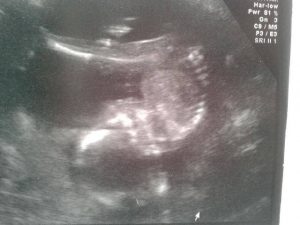
Sometimes sacral agenesis/caudal regression syndrome (SA/CRS) is diagnosed during pregnancy during a prenatal ultrasound. Of course, this experience is frightening for most parents. We have collected the stories of parents who have been through this experience here. Also, summarized below are research articles that describe potential indicators seen in some fetal ultrasounds which may point to SA/CRS or other conditions of the spine.
Transcript of Jacob’s Video Story
Read More Stories
Iman’s Story (English)
Iman’s Story (Arabic)
Research about ultra-sound indicators
Researchers S. K. Singh, R. D. Singh, and A. Sharma (2005) produced a case study and literature review on SA/CRS. M. Boulas, in a journal article “Recognition of caudal regression syndrome” (2009), suggested a number of prenatal ultrasound features which may indicate SA/CRS. This information was compiled by a group of researchers in the Netherlands in an article in 2016 (F. Fontanella, et al.). Although the 2016 article is relatively recent, keep in mind that the list is based on small number of case studies from the 2005 and 2009 reports. It is nevertheless a listing of ultrasound characteristics that doctors might use to alert them to the possibility of SA/CRS (as well as to a number of other conditions with the same early indicators). Not all of the features or conditions listed are directly related to SA/CRS and not all of these issues would be present in a single fetus.
Broad indicators during the first trimester
abnormal appearance of the yolk sac
Shorter CRL than expected for the gestational age
Increased nuchal translucency
Sacral agenesis (absence of the lower spine)
In the second and third trimester increasingly more specific indicators may be present:
SPINE:
Partial or complete absence of the sacrum and sacral vertebrae/lower spine
Scoliosis and kyphosis
Abnormal vertebral ossification
Decreased interspace between femoral heads
LIMBS:
Clubfeet
Flexion contractures of the lower extremities
Syndactyly/polydactyly (may be present in addition to absence of spine)
CNS: (Central Nervous System)
Spina bifida, meningeocele or myelomeningocele (may be present in addition to absence of spine)
Hydromcephaly (may be present in addition to absence of spine)
Microcephaly, ancecephaly or holoprosencephally (may be present in addition to absence of spine)
FACE (independent of SA/CRS but may be present in addition to the condition of SA/CRS)
Pierre Robin syndrome
Facial clefts
CARDIAC (issues may be present in addition to absence of spine)
Ventricular septal defect
Transposition of great vessels
Dextrocardia
Coarticulation of the aorta
GU TRACT (Genitourinary tract) (may be present in addition to absence of spine)
Renal agenesis or renal dysplasia
Hydronephosis
Dilated/ectopic ureters
Ambiguous genetalia hypospadias
Vesical/cloacal exstrophy
Absent bladder
Enlarged and thick walled bladder
GI TRACT (Gastrointestinal tract) (may be present in addition to absence of spine)
Abdominal wall defect
Making Difficult Decisions
Reading a list like this can be overwhelming. Keep in mind that no single child presents with all of these conditions. These are indicators that doctors use to further explore potential diagnosis of many different conditions, not just SA/CRS. Very often an option suggested to parents is abortion. Sometimes parents base these decisions on a worst case scenario that a doctor may provide. Sometimes the doctors has no actual experience with the condition. It is important to keep in mind that doctors usually cannot predict the exact outcome of this diagnosis nor a child’s potential. The experiences of a majority of families is that their children far surpass the predictions made by medical professionals and these same children enrich the lives of families beyond measure.
